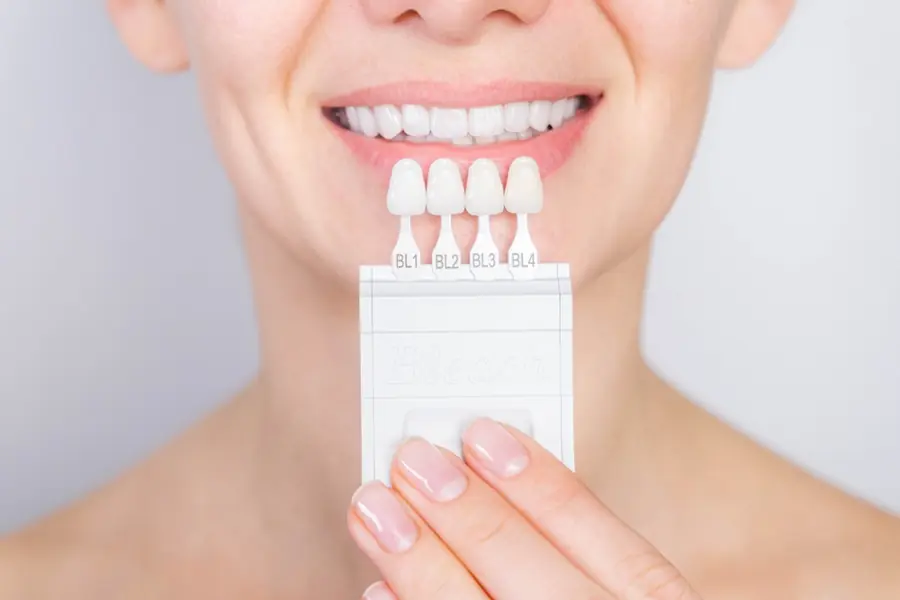Dental veneers stand out as a highly favored option to improve tooth appearance, offering a transformative solution for a wide range of dental imperfections. This buyer’s guide is meticulously crafted for patients at Palmetto Family and Cosmetic Dentistry, aiming to provide a comprehensive overview of dental veneers, from understanding what they are and the benefits they offer to choosing the right type and ensuring their longevity.
Introduction to Dental Veneers
Dental veneers are thin shells that are made to individual specifications and are intended to cover the front of the surface of teeth for cosmetic purposes improving their appearance. These shells are bonded to the teeth, changing their color, shape, size, or length.
Veneers can address various cosmetic concerns, including chipped, broken, discolored, or smaller-than-average teeth. They can also rectify gaps between teeth or teeth that are worn down.
Types of Dental Veneers
Teeth veneers are thin bespoke shells that cover teeth for aesthetics, improving their appearance. These are categorized primarily into two types:
- Porcelain Veneers: Known for their durability and natural porcelain veneers are stain-resistant therefore useful and have a beautiful appearance that mimic the light-reflecting properties of natural teeth. They usually require multiple visits to the dentist for customization and application but can last for a decade or more with proper care.
- Composite Resin Veneers: Produced from a resin that is tooth-colored, these veneers are less expensive and can often be fabricated and applied in a single visit. It is possible that To a greater extent than porcelain veneers, composite veneers will require replacement or repair more frequently because they are not as long but they offer a cost-effective option for improving the appearance of your smile.
Choosing the Right Type of Veneer
When deciding between porcelain and composite resin veneers, consider the following factors:
- Longevity and Durability: If a long-term solution is what you’re after, porcelain veneers might be the better choice.
- Investment and Budget: Evaluate your budget and consider the cost-benefit ratio. Composite veneers offer a more affordable upfront cost but may require more frequent replacements.
- Aesthetic Goals: Discuss with your dentist the look you are aiming to achieve. Porcelain veneers generally provide a more natural and translucent appearance, closely mimicking real teeth.
- Lifestyle Considerations: Your daily habits, such as diet and oral hygiene practices, can influence the longevity and appearance of your veneers.
The Process of Getting Dental Veneers
- Consultation: The first step involves a thorough consultation with your dentist at Palmetto Family and Cosmetic Dentistry to discuss your goals and evaluate if veneers are the best option for you.
- Preparation: For porcelain veneers, a small amount of enamel is removed from the front and sides of your teeth. This makes space for the veneers and slightly roughens the teeth for better adhesion. Composite veneers require less enamel removal, if any.
- Impression and Customization: An impression of your teeth are extracted and then transported to a dental laboratory, where they are processed and your custom veneers are created (for porcelain veneers). Composite veneers are sculpted directly onto your teeth in the dental office.
- Bonding: Once your porcelain veneers are ready, or your teeth are prepared for composite veneers, additionally, the veneers will be applied on your teeth by the dentist, make any necessary adjustments, and then bond them in place.
Caring for Your Dental Veneers
Caring for your dental veneers is essential to maintain their appearance and longevity. Here are some tips for proper care:
- Practice Good Oral Hygiene: You should brush your teeth using fluoride toothpaste and a gentle toothbrush at least twice a day without fail. Plaque and food particles can be removed from between your teeth and around the edges of your veneers by employing the practice of flossing on a daily basis.
- Avoid Staining Foods and Beverages: While porcelain veneers are resistant to staining, it’s still essential to minimize exposure to foods and beverages that discolor teeth, like coffee, tea, red wine, and dark-colored sauces. If you consume, brush your teeth or rinse your mouth after using these goods reduce the risk of staining.
- Quit Smoking: Smoking can cause discoloration of both natural teeth and veneers. Stopping smoking improves your health and helps maintain the appearance of your veneers.
- Wear a Mouthguard: If you grind or clench your teeth at night, consider wearing a mouthguard to protect your veneers from damage. Clenching or grinding can overstress your teeth and may cause your veneers to chip or crack.
- Avoid Chewing on Hard Objects: Refrain from biting or chewing on hard objects such as ice, pens, pencils, or fingernails, as this can chip or damage your veneers.
- Regular Dental Check-Ups: For healthy teeth and veneers, visit your dentist regularly for checkups and cleanings. Your dentist can spot problems early and address them before they worsen.
- Use Non-Abrasive Toothpaste: Choose a non-abrasive toothpaste when brushing your teeth to avoid scratching or damaging the surface of your veneers.
- Be Gentle with Your Veneers: While veneers are durable, they are not indestructible. Avoid using your teeth to open packages or bite into hard objects, and be mindful of any habits that could potentially damage your veneers.
Following these suggestions and practicing proper oral hygiene will help you ensure that your dental veneers stay looking their best for years to come. If you have any concerns about the care of your veneers or notice any changes in their appearance or function, consult your dentist for advice.
Cost and Financing
Dental veneer prices vary on the type of material chosen, the number of veneers needed, and other individual factors. Veneers made of porcelain are typically more expensive than veneers made of composite resin because of the higher expenses of the materials and the additional lab work that is required.
A significant number of dental insurance policies do not provide coverage for cosmetic costs procedures like veneers, but financing options may be available through your dental practice. Discuss these options with Palmetto Family and Cosmetic Dentistry to find a payment plan that suits your budget.
Dental veneers offer a transformative solution for enhancing your smile, correcting a range of cosmetic dental issues with a procedure that’s less invasive than many other restorative options.
Whether you opt for the durability and natural appearance of porcelain veneers or the cost-effectiveness and convenience of composite resin veneers, choosing the appropriate dental office is the most important factor in determining the result of the situation.
At Palmetto Family and Cosmetic Dentistry, patients can expect a personalized approach, where their individual needs and aesthetic goals are carefully considered, ensuring a beautiful, long-lasting smile.
By understanding the process, weighing the pros and cons of each type of veneer, and taking proper care of your veneers, you can experience the boost in self-assurance that comes with having a beautiful and bright smile for years to come. Contact us now and schedule your appointment with us!

